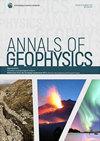Long-term sustainability of a distributed RI: the EPOS case
IF 1.2
4区 地球科学
Q3 GEOCHEMISTRY & GEOPHYSICS
引用次数: 1
Abstract
The European Plate Observing System (EPOS) is a distributed research infrastructure (RI) with the mission to establish and maintain sustainable and long-term access to solid Earth science data and services by integrating the diverse national research infrastructures under a common federated framework governed by EPOS ERIC (European Research Infrastructure Consortium). This paper presents the EPOS approach to ensure financial viability and to tackle the challenge of long-term sustainability of the RI during its operational phase. The EPOS approach to sustainable operation considers the scientific impact and the promotion of scientific research as the preconditions to achieve long-term sustainability. Enabling scientific excellence implies that high-quality data and services are provided reliably and continuously to establish the RI as the enabler of investigations to solid Earth scientists. The strategic approach and the solutions adopted by EPOS ERIC to address the long-term sustainability of a pan-European distributed RI are discussed in this paper focusing on the governance structure, considered as the qualifying dimension that gathers and connects the financial, legal and technical dimensions. The governance and the financial models are discussed to delineate the legal framework necessary to operate the EPOS RI relying on the implemented technical solutions. A sufficiently stable investment environment is necessary to allow the RI to concentrate on providing high quality services for their user communities. This paper discusses the current actions and challenges to be addressed for achieving this goal.分布式RI的长期可持续性:EPOS案例
欧洲板块观测系统(EPOS)是一个分布式研究基础设施(RI),其使命是通过在EPOS ERIC(欧洲研究基础设施联盟)管理的共同联邦框架下整合不同的国家研究基础设施,建立和维护可持续和长期的固体地球科学数据和服务。本文介绍了epo方法,以确保财务可行性,并解决国际扶轮在其运作阶段的长期可持续性的挑战。EPOS的可持续经营方法将科学影响和促进科学研究作为实现长期可持续性的前提条件。实现科学卓越意味着可靠和持续地提供高质量的数据和服务,以使RI成为固体地球科学家调查的推动者。本文讨论了EPOS ERIC为解决泛欧分布式RI的长期可持续性而采用的战略方法和解决方案,重点是治理结构,被认为是收集和连接财务,法律和技术维度的合格维度。本文讨论了治理和财务模型,以描述依赖于实施的技术解决方案运行EPOS RI所需的法律框架。一个足够稳定的投资环境是必要的,以使国际扶轮能够集中精力为其用户社区提供高质量的服务。本文讨论了实现这一目标的当前行动和需要解决的挑战。
本文章由计算机程序翻译,如有差异,请以英文原文为准。
求助全文
约1分钟内获得全文
求助全文
来源期刊

Annals of Geophysics
地学-地球化学与地球物理
CiteScore
2.40
自引率
0.00%
发文量
38
审稿时长
4-8 weeks
期刊介绍:
Annals of Geophysics is an international, peer-reviewed, open-access, online journal. Annals of Geophysics welcomes contributions on primary research on Seismology, Geodesy, Volcanology, Physics and Chemistry of the Earth, Oceanography and Climatology, Geomagnetism and Paleomagnetism, Geodynamics and Tectonophysics, Physics and Chemistry of the Atmosphere.
It provides:
-Open-access, freely accessible online (authors retain copyright)
-Fast publication times
-Peer review by expert, practicing researchers
-Free of charge publication
-Post-publication tools to indicate quality and impact
-Worldwide media coverage.
Annals of Geophysics is published by Istituto Nazionale di Geofisica e Vulcanologia (INGV), nonprofit public research institution.
 求助内容:
求助内容: 应助结果提醒方式:
应助结果提醒方式:


